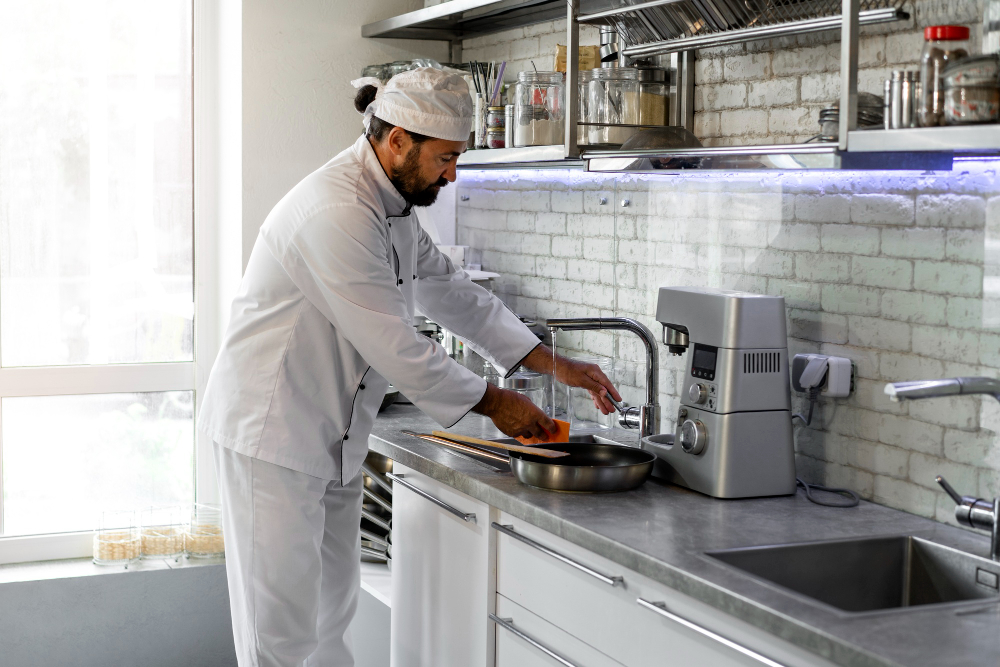A commercial kitchen is a dynamic place bustling with the sounds of cooks and employees preparing delicacies. However, it is also a place to monitor the kitchen hygiene and comfort of the chefs and the customers as well. Cleaning and sanitizing are paramount to each other for the satisfaction of customers, so that they return to taste that delicious food and chefs, so that they can cook those delicious dishes. A poorly maintained kitchen may cause a lot of issues, including food poisoning and legal issues. Therefore, following a strict routine of hygiene will save all the trouble and keep the business running for a long time.
At Alister, we not only sell products, but our website also helps you in managing those products and improving productivity. In this blog, we will give you some tips on how to clean kitchen utensils effectively, ensuring your tools remain spotless and safe for repeated use. From stainless steel pans to delicate glassware, our tips cover every material and cleaning method.
Follow The Four C’s Of Food Hygiene
One of the easiest ways to maintain food safety in a commercial kitchen is by following the Four C’s: Cleaning, Cooking, Chilling, and Cross-contamination. These principles form the foundation of a hygienic and efficient kitchen environment:
- Cleaning:- Keep all kitchen equipment, utensils, surfaces, and hands clean and sanitized at all times. Use appropriate cleaning products and tools, and follow a kitchen hygiene schedule that includes daily, weekly, and monthly tasks. Regularly clean grease traps, deep clean appliances, and always wash hands before and after handling food.
- Cooking:- Cook food to the correct temperature and duration to eliminate harmful bacteria. Use a food thermometer to verify internal temperatures and follow recommended guidelines for different food types. Proper cooking not only ensures safety but also enhances flavor and texture.
- Chilling:- Store food at safe temperatures to prevent bacterial growth and spoilage, maintaining kitchen hygiene. Refrigerate or freeze items promptly, maintain optimal appliance temperatures, and label containers with dates. Use the FIFO method to rotate stock and thaw frozen items safely, never at room temperature.
- Cross-contamination:- Prevent the spread of bacteria between foods and surfaces. Use separate cutting boards and utensils for raw and cooked items, and sanitize them after each use. Store raw food below cooked food, wash produce before prep, and avoid reusing marinades or serving dishes that touched raw ingredients.
Proper Dishwashing & Utensil Hygiene
Proper dishwashing and utensil hygiene are critical components of maintaining a safe and efficient commercial kitchen. All dishes, cutlery, and cooking tools should be washed with hot water and food-safe sanitizers immediately after use to eliminate bacteria and food residue. Air-drying is preferable to towel drying, as it reduces the risk of cross-contamination. Utensils must be stored in clean, dry areas to prevent moisture buildup and microbial growth. Regular inspections and cleaning of dishwashing equipment also ensure consistent performance and hygiene. These practices are not just about cleanliness; they’re a key part of overall kitchen maintenance, helping to uphold food safety standards and boost operational efficiency. To support these hygiene standards, investing in a reliable dishwashing unit is essential, like the ones offered by Alister, built for high-performance cleaning in commercial kitchens.
Waste Management & Pest Control
Effective waste management and pest control are vital for maintaining a clean and safe commercial kitchen. Proper disposal of food scraps, packaging, and grease helps prevent unpleasant odors and deters pests like rodents, flies, and cockroaches. Use sealed bins, empty them regularly, and sanitize waste areas to avoid bacterial buildup. Implement preventive pest control measures such as traps, routine inspections, and professional treatments. Ensure food storage areas are clean and dry, with no access points for pests. These practices are essential for upholding high standards of kitchen hygiene, protecting both the food being prepared and the health of kitchen staff and customers.
Conclusion
Maintaining a commercial kitchen that is safe, efficient, and hygienic requires a disciplined approach and a commitment to best practices. From implementing the Four C’s of food hygiene, cleaning, cooking, chilling, and cross-contamination, to ensuring proper dishwashing, waste disposal, and pest control, every detail matters. These routines not only protect the health of your staff and customers but also enhance the overall quality of your culinary operations. At Alister, we understand the importance of consistent kitchen hygiene, which is why we offer not just premium products but also expert guidance and digital tools to help you manage them effectively. With Alister by your side, your kitchen stays clean, compliant, and ready to deliver excellence every day.
FAQs
1. Why is kitchen hygiene important in a commercial setting?
Maintaining proper kitchen hygiene prevents foodborne illnesses, ensures customer safety, and helps meet regulatory standards. It also boosts staff morale and protects your brand reputation.
2. What are the Four C’s of food hygiene?
The Four C’s stand for Cleaning, Cooking, Chilling, and Cross-contamination. These principles help minimize health risks and maintain a safe food preparation environment.
3. How often should I clean commercial kitchen equipment?
Daily cleaning is essential for surfaces and utensils. Deep cleaning of ovens, fryers, and refrigerators should be scheduled weekly or monthly, depending on usage.
4. What’s the best way to clean kitchen utensils?
Use hot water and food-safe sanitizers, then air-dry utensils to prevent moisture-related bacterial growth. Proper storage in clean, dry areas is also crucial.
5. How can I prevent cross-contamination in my kitchen?
Use separate cutting boards and utensils for raw and cooked foods, sanitize surfaces regularly, and store raw items below cooked ones in sealed containers.
6. What are some effective pest control measures for commercial kitchens?
Seal waste bins, clean disposal areas frequently, and schedule regular pest inspections. Use traps and professional treatments as needed to prevent infestations.
7. How does Alister support kitchen hygiene and maintenance?
Alister offers high-quality kitchen equipment along with expert resources on cleaning, sanitizing, and productivity. Our tools and tips help streamline operations and uphold hygiene standards.
